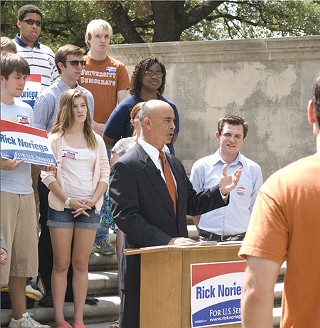Noriega on Energy ... Looks Familiar
Rick Noriega announces his energy plan
By Lee Nichols, Fri., Aug. 1, 2008
You know those kids' puzzles where you have to find the four or five differences between two nearly identical cartoons? That's how Texas voters might feel as they try to distinguish between the energy plans of our incumbent junior U.S. senator, Republican John Cornyn, and his Democratic challenger, state Rep. Rick Noriega of Houston.
On July 15, Noriega unveiled his energy plan, in an attempt to attack Cornyn on one of the few issues that Republicans have going for them this election. Noriega's ideas – available online at www.ricknoriega.com/energyplan – contain some surprises not normally expected from a Democratic candidate. For example, rather than shunning the idea of offshore drilling, Noriega embraces it.
Noriega – an employee of CenterPoint Energy – leads with a big emphasis on renewables, but tucked away on p.4 of the 11-page document is a call to lift the ban on offshore drilling. "Rick Noriega believes that we cannot drill ourselves out of our current problems but recognizes that we must attack our energy problem from all angles," the policy paper reads, "which includes allowing offshore drilling as long as that oil is required to be used in the United States, not exported overseas. The Noriega plan will encourage states to decide for themselves on their drilling plans and will support lifting the congressional ban on offshore exploration."
Noriega's plan also includes a call for oil companies to wring what they can from currently unused leases they hold. Calling such leases "potentially highly productive," he demands that the companies "drill or give up the leases they hold on 68 million acres of undeveloped federal land."
Noriega does propose ambitious renewable-energy goals, the most notable being "100% in 10": He calls for all of Texas' household electricity usage to come from renewable sources by 2019 – "10 years after Noriega will take office," as the paper puts it. He also calls for a national renewable portfolio standard (requiring 20% of the nation's electricity to come from renewable sources by 2020), a renewable fuels standard (making available more alternative-fuels gas pumps), heavily investing in research and development of alternative fuels, safer nuclear and "clean coal" technologies, and improving the transmission grid to deliver wind power from West Texas. Other initiatives include raising Corporate Average Fuel Economy standards – the average miles per gallon of automakers' fleets – to 50 mpg by 2020, establishing a National Energy Secretary office in Texas to capitalize on our state's role in the energy industry, strengthening the Federal Trade Commission's authority to investigate artificial price hikes, and subjecting OPEC to American antitrust laws.
Cornyn quickly counterattacked. The morning after the plan's unveiling, spokesman Kevin McLaughlin issued a press release stating, "Maybe today he will explain why he thinks most states should choose their energy destiny, but not Alaska," McLaughlin wrote, referring to popular sentiment in that state that the Arctic National Wildlife Refuge should be opened to drilling. Asked about that later at a UT campus press conference, Noriega replied that if Alaskans vote in favor of drilling the refuge, "I would certainly take another look at it." However, in a Monday teleconference, Noriega backtracked and said that he regarded the refuge as federal property and different from the offshore waters of states. (It's worth noting that state authority over coastal waters extends only three miles – after that, it's federal property for about 50 miles.)
Following the UT event, McLaughlin pointed out the obvious – that offshore drilling has been part of the Republican "Drill Here, Drill Now" campaign, not the Democrats' agenda. "Eighty percent of his plan is pretty much the same as John Cornyn's," McLaughlin said. "The only difference is where he gets off the rails a little bit and talks about suing OPEC and investigating American energy companies regarding price gouging, and that's his solution for immediate relief. Quite frankly, basic economics tells us this is a supply and demand issue."
The drilling component wasn't enough to deter Luke Metzger of Environment Texas from heaping praise on the plan: "It's pretty good. I'm pretty excited about it. There's definitely a few things I don't agree with, but overall it's pretty bold and really takes advantage of a lot of what Texas has to offer as far as renewable energy. The 100 percent renewable energy for homes is a pretty big deal. ... I'm not excited about the drilling offshore and the support of nuclear power, but by and large, it's pretty impressive." Metzger called the "100%" proposal (which echoes a similar national challenge recently issued by former Vice President Al Gore) "entirely realistic."
As for Cornyn, "He's routinely voted against ambitious energy plans," Metzger says. "On a number of issues, he's been on the wrong side. ... His emphasis is definitely on maintaining the status quo and trying to eke out the last bits of fossil fuels without having a strong plan to break our dependence."
Both Metzger and Noriega targeted Cornyn for voting last year against House Resolution 6049, a renewable-energy bill. McLaughlin defended the "nay" vote against a bill that "raised taxes, gave benefits to trial lawyers, and contained numerous earmarks that disadvantaged Texas."
Former Austin Chronicle environmental reporter Robert Bryce offers quite a different take from Metzger, dismissing both Noriega and Cornyn. Bryce, now the managing editor of Energy Tribune, a trade publication, doubts that energy independence is even possible – in fact, his most recent book is titled Gusher of Lies: The Dangerous Delusions of "Energy Independence". Bryce supports offshore drilling but says, "The 'energy independence' line polls well, but they both should know it's hogwash."
"The first thing that jumps out to me is that Noriega is breaking with the Democrats and saying that he is in favor of more offshore drilling," Bryce says. "The Democratic leadership – [House Speaker Nancy] Pelosi, [Senate Majority Leader Harry] Reid, and [House Majority Leader Steny] Hoyer – are all [in] lockstep against that. ... And he says, 'Let's lift the ban on offshore drilling,' but he doesn't say a word about [the Arctic National Wildlife Refuge].
"If you look at Noriega's [energy plan] and Cornyn's [literature], they both have the big pictures of the windmills. And so, windmills are fashionable now, and everybody's saying, 'This is the solution to the future.' Well, no, it's not. It's just flat not. It's not going to necessarily reduce our foreign oil consumption as Boone Pickens claims, but they make pretty pictures, and so people use them. ... Noriega's plan seems to be standard Democratic Party boilerplate, except for the offshore drilling."
Noriega says the plan's ambitiousness is not a reason to dismiss it. "I have full faith and confidence in our capacity to realize that new mousetrap," Noriega said. "How absurd did we all think it was when the president [Kennedy] stood up there and said, 'Before the end of the decade, we'll put a man on the moon'?"
Got something to say on the subject? Send a letter to the editor.









